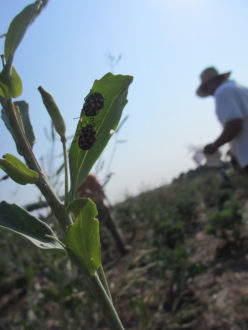GRIFFIN, Georgia – The Southern Sustainable Agriculture Research and Education (SSARE) program has announced its 2020 Research and Education Grant awards. Funding includes both research-based and education-based projects awarded to NGOs, university researchers, government agency specialists and other ag professionals to further sustainable agriculture production and marketing practices across the region.
Research Grants are competitive research grants for teams of interdisciplinary researchers that encourage a systems approach in sustainable agriculture.
Research-based projects, totaling $3,513,647, include:
LS20-332 Silvopasture for Poultry Production with Outdoor Access: Impact on animal welfare, economic, and environmental parameters, $275,079, Virginia Tech, Leonie Jacobs, jacobsl@vt.edu
LS20-333 Development of a Sustainable Cropping System for Industrial Hemp Production by Limited-Resource Farmers, $229,933, North Carolina A&T University, Beatrice Dingha, bndingha@ncat.edu
LS20-334 Optimizing Nutrient and Water Management for Organic Mixed Vegetable Production Systems, $299,116, University of Florida, Gabriel Maltais-Landry, maltaislandry@ufl.edu
LS20-335 Cover Crops and Cropping System Sustainability in a Changing Global Climate, $299,995, Middle Tennessee State University, Samuel Haruna, Samuel.haruna@mtsu.edu
LS20-336 Navigating Financial and Mental Health Crises, $299,959, RAFI-USA, North Carolina, Scott Marlow, smarlow@rafiusa.org
LS20-337 Development and Evaluation of IPM Systems Components for Insect Pests and Pathogens of Cucurbit Crops in the Southeastern U.S., $299,935, Virginia Tech, Thomas Kuhar, tkuhar@vt.edu
LS20-338 Researching and Networking Native American and Socially Disadvantaged Farmers Traditional Market Gardening Production System Resiliency, $299,411, Langston University, Oklahoma, Joshua Ringer, Joshua.ringer@langston.edu
LS20-339 Exploring Agritourism to Increase Agricultural Sustainability and Resilience in the Municipality of Utuado, Puerto Rico, $300,000, Troy University, Georgia, Patrick Holladay, pholladay@troy.edu
LS20-340 Pecan Hedge-pruning: A sustainable management option for the Southeastern U.S., $299,893, University of Georgia, Angel Acebes-Doria, aacebes@uga.edu
LS20-341 Assessing Water Use Efficiency, Soil Health, and Pollinators within a Transition from Irrigation to Dryland Management in the Texas High Plains, $299,208, Texas Tech University, Charles West, chuck.west@ttu.edu
LS20-342 Enhancing Hedgerow Systems in Fruit Tree Production to Improve Beneficial Insect Diversity and Abundance, $311,118, University of Florida, Xavier Martini, xmartini@ufl.edu
LS20-343 Toward Culturally Responsive Disaster Management for Limited-Resource Producers: The role of person, place and professional agencies, $300,000, Prairie View A&M University, Noel Estwick, nmestwick@pvamu.edu
Education Grants accommodate organizations and individuals who are interested in education-based projects, rather than research-driven projects. There is no research involved in these grant projects.
Education-based projects, totaling $521,023, include:
LS20-321 Small Ruminant Producers Program: A pilot program for small ruminant producers and county agents, $31,896, North Carolina A&T University, PI TBA.
LS20-322 HABESHA Agriculture Leadership Opportunity (HALO Program), $48,440, HABESHA, Inc., Georgia, Cashawn Myers, info@habeshainc.org
LS20-323 Building Resilient and Successful Farm Businesses in the Southern Appalachians, $50,000, Organic Growers School, North Carolina, Cameron Farlow, Cameron@organicgrowersschool.org
LS20-324 Organic Soil Health Education Conference and Resources for the Southern SARE Region Farmers and Ranchers, $49,882, Organic Farming Research Foundation, California, Lauren Snyder, lauren@ofrf.org
LS20-325 Scaling Up Production and Local Marketing for Minority and Limited-Resource Farmers, $49,777, NCAT Gulf States, Mississippi, Felicia Bell, feliciab@ncat.org
LS20-326 Promoting Southeastern Agriculture Resilience with Carbon Farming Planning, $50,000, NC Foundation for Soil and Water Conservation, Michelle Lovejoy, ncfswc@gmail.com
LS20-327 A Modular Curriculum for Growing Food Grain for the Local Market, $50,004, Common Grain Alliance, Virginia, Heather Coiner, h.coiner@gmail.com
LS20-328 Preventing Heirs Property and Increasing Agricultural Sustainability: A training for extension agents and limited-resource farmers in rural Georgia, $50,000, The Georgia Heirs Property Law Center, Inc., Skipper StipeMaas, skipperstipemaas@gaheirsproperty.org
LS20-329 Agroecosystem Sustainable Guides, $41,040, ECO-Services, Puerto Rico, Silmarie Crespo, silmarie.crespo@upr.edu
LS20-330 Agro-ecological Education for New Farmers in the Central Western Region of Puerto Rico, $49,992, Plenitud PR, Rebekah Sanchez, Rebekah@plenitudpr.org
LS20-331 Building Grassroots Infrastructure for Peer-to-Peer Learning and Support for Sustainable Farmers in Alabama, $49,992, Alabama Sustainable Agriculture Network, Alice Evans, alice@asanonline.org
Southern SARE’s Research and Education Grants Call for Pre-proposals opens in March. Selected pre-proposals are invited to submit full proposals in August and awards are announced February the following year.
Research-based grants are funded up to $400,000 for three-year projects. Education-based grants are funded up to $50,000 for two-year projects.
Published by the Southern Region of the Sustainable Agriculture Research and Education (SARE) program. Funded by the USDA National Institute of Food and Agriculture (NIFA), Southern SARE operates under cooperative agreements with the University of Georgia, Fort Valley State University, and the Kerr Center for Sustainable Agriculture to offer competitive grants to advance sustainable agriculture in America's Southern region. This material is based upon work that is supported by the National Institute of Food and Agriculture, U.S. Department of Agriculture, through Southern Sustainable Agriculture Research and Education. USDA is an equal opportunity employer and service provider. Any opinions, findings, conclusions, or recommendations expressed in this publication are those of the author(s) and do not necessarily reflect the view of the U.S. Department of Agriculture.
